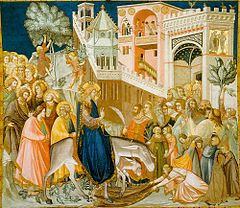| Palm Sunday | |
|---|---|
 Entry of Jesus Christ into Jerusalem (1320) by Pietro Lorenzetti: entering the city on a donkey symbolizes arrival in peace rather than as a war-waging king arriving on a horse.[1][2] | |
| Also called | Sixth Sunday of Lent, Palm and Passion Sunday |
| Observed by | Christians |
| Significance | commemorates Christ's triumphal entry into Jerusalem; first day in Holy Week |
| Observances | Church attendance, blessing and distribution of palms, church processions, weaving palm crosses, hanging palm branches obtained from church liturgies behind Christian artwork or placing palm branches in Bibles and daily devotional books |
| Date | Moveable feast, Sunday before Easter |
| 2023 date |
|
| 2024 date |
|
| 2025 date |
|
| 2026 date |
|
Palm Sunday is the Christian moveable feast that falls on the Sunday before Easter. The feast commemorates Christ's triumphal entry into Jerusalem, an event mentioned in each of the four canonical Gospels.[3] Its name originates from the palm branches waved by the crowd to greet and honor Jesus Christ as he entered the city. Palm Sunday marks the first day of Holy Week; in Western Christianity, this is the beginning of the last week of the solemn season of Lent, preceding Eastertide,[4][5][6][7] while in Eastern Christianity, Holy Week commences after the conclusion of Great Lent.[8]
In most Christian rites, Palm Sunday is celebrated by the blessing and distribution of palm branches (or the branches of other, native trees), representing the palm branches that the crowd scattered before Christ as he rode into Jerusalem. These palms are sometimes woven into crosses. The difficulty of procuring palms in unfavorable climates led to the substitution of branches of native trees, including box, olive, willow, and yew.
Many churches of mainstream Christian denominations, including the Orthodox, Catholic, Lutheran, Methodist, Anglican, Moravian, and Reformed traditions, distribute palm branches to their congregations during their Palm Sunday liturgies. Christians take these palms, which are often blessed by clergy, to their homes, where they hang them alongside Christian art (especially crosses and crucifixes) or keep them in their Bibles and daily devotional books.[9] In the days preceding the next year's Lent, known as Carnival or Shrovetide, churches often place a basket in their narthex to collect these palms, which are then ritually burned on Shrove Tuesday to make the ashes to be used on the following day, Ash Wednesday, which is the first day of Lent.[10][11]
- ^ Matthew 19–28 by William David Davies, Dale C. Allison 2004 ISBN 0-567-08375-6 p. 120
- ^ John 12–21 by John MacArthur 2008 ISBN 978-0-8024-0824-2 pp. 17–18
- ^ Mark 11:1–11, Matthew 21:1–11, Luke 19:28–44, and John 12:12–19.
- ^ Cooper, J.C. (23 October 2013). Dictionary of Christianity. Routledge. p. 124. ISBN 9781134265466. Archived from the original on 5 July 2014. Retrieved 25 April 2014.
Holy Week. The last week in LENT. It begins on PALM SUNDAY; the fourth day is called SPY WEDNESDAY; the fifth is MAUNDY THURSDAY; the sixth is GOOD FRIDAY; and the last 'Holy Saturday', or the 'Great Sabbath'.
- ^ Brewer, Ebenezer Cobham (1896). The Historic Notebook: With an Appendix of Battles. J. B. Lippincott. p. 669. Archived from the original on 5 July 2014. Retrieved 25 April 2014.
The last seven days of this period constitute Holy Week. The first day of Holy Week is Palm Sunday, the fourth day is Spy Wednesday, the fifth Maundy Thursday, the sixth Good Friday, and the last Holy Saturday or the Great Sabbath.
- ^ Blackwell, Amy Hackney (2009). Lent, Yom Kippur, and Other Atonement Days. Infobase Publishing. pp. 15–16. ISBN 978-1-4381-2796-5.
The last week of Lent is called Holy Week in the Western Churches, and Great and Holy Week in the Eastern. During this week, believers remember the events in the last week of Jesus' life. These include Jesus' entrance into Jerusalem and his suffering on the way to crucifixion, which are sometimes called the "Passion of Jesus Christ," or "Passion of Christ."
- ^ Melton, J. Gordon (13 September 2011). Religious Celebrations: An Encyclopedia of Holidays, Festivals, Solemn Observances, and Spiritual Commemorations [2 volumes]. ABC-CLIO. p. 527. ISBN 978-1-59884-206-7.
Lent (Ash Wednesday through Holy Saturday): The season of Lent begins with Ash Wednesday and lasts until the final Saturday before Easter, Holy Saturday. It includes "Holy Week," the week before Easter. For six weeks preceding Easter, it is a time of penitential prayer, fasting, and almsgiving to prepare for the celebration of the resurrection of Jesus on Easter Sunday. This season of Lent originally was also a time of preparation for baptismal candidates and those separated from the Church who were rejoining the community. Holy Week, the last week of Lent, commemorates the last week of the earthly life of Jesus Christ. It covers the events of his triumphal entry into Jerusalem, the last supper, the arrest, and his death by crucifixion. Beginning with the sixth Sunday of Lent, Holy Week includes Palm Sunday, Spy Wednesday, Maundy Thursday, Good Friday, and Holy Saturday.
- ^ "Overview of Holy Week in the Orthodox Church". Greek Boston. 24 March 2010. Retrieved 2 April 2023.
Holy Week in the Orthodox Church (for Greeks, Russians and any other nationalities that are Orthodox Christian) takes place in the week after Great Lent and just before Pascha, or Orthodox Easter. The last day of lent is the Saturday of Lazarus, which celebrates when Jesus raised Lazarus from the dead. Holy Week officially begins with Palm Sunday and follows the last week of Christ's life before His death and resurrection.
- ^ Kirk, Lisa (25 March 2018). "Ideas for Displaying Palm Sunday Palms Around Your Home". Blessed Is She. Retrieved 4 April 2020.
- ^ "This Sunday at Grace: February 4, 2018". Grace Episcopal Church. 3 February 2018. Retrieved 4 April 2020.
- ^ "Shrove Tuesday". The Times-Reporter. 18 February 2020. Archived from the original on 6 August 2020. Retrieved 4 April 2020.